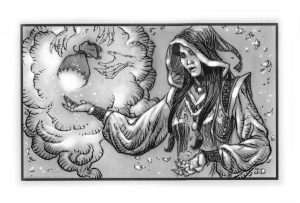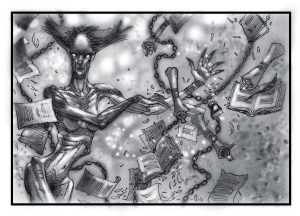 Last week we began a series of previews for the upcoming Questors sourcebook, providing an overview of how things have changed from previous versions. That continues this week, where we look at questor advancement and the new Devotion Point rules.
Last week we began a series of previews for the upcoming Questors sourcebook, providing an overview of how things have changed from previous versions. That continues this week, where we look at questor advancement and the new Devotion Point rules.
To start, though, I want to talk about the Questor devotion, the keystone of the questor system. As I said last week, it now works similar to Versatility: the rank in Questor determines how many (and how powerful) their other devotions (sometimes called “granted devotions”) can be.
The Questor devotion does a couple of other things as well. It represents how strongly aligned the questor is with their patron; the higher the rank, the stronger the bond. As mentioned, this determines which powers they can choose from. As their rank in Questor increases, they gain bonuses to Defense ratings and other game characteristics like an adept (the exact benefits depend on the Passion), and the Questor rank also determines their Devotion Point pool.
In addition to the mechanical benefits, there is something else the questor can do with this devotion. The questor may use it to commune with their patron. Each success on a test gives them insight, inspiration, or instruction on what the Passion wants their follower to do. The higher the questor’s rank, the more guidance they are likely to gain. This is intended as a way for the GM to provide story hooks, cryptic clues, and similar details, as well as an opportunity to bring a roleplaying angle to the questor’s relationship with their chosen Passion.
Devotion Points
The changes to the Questor devotion aren’t that radical a departure from earlier editions. Devotion Points, however, have seen a much more dramatic change.
In previous editions, a questor earned Devotion Points by performing acts of devotion; deeds that represent the Passion’s ideals. By performing these tasks, the questor demonstrates their devotion, and the more acts they perform, the stronger the connection with their patron can become. The accumulated points were tracked (and it was possible to lose points), and the Devotion Point total would determine the maximum potential rank for the questor.
There were originally three levels for acts of devotion: Minor, Major, and Zealous. A fourth category was added, Quest, which represented a specific long-term goal the questor could pursue, which could award even more Devotion Points.
A questor still performs acts of devotion, and still earns Devotion Points for doing so. But they no longer serve to restrict the questor’s rank. They now behave similar to the way Karma Points work for adepts, but for devotions and actions that relate to the Passion’s ideals.
A questor only earns Devotion Points for acts of devotion–they don’t refill automatically (though they can earn a small number of points when they use the Questor devotion to commune with their Passion). Similar to Karma, spending a point allows the questor to add a die to a test. The die added depends on the questor’s tier: Followers (rank 1-4) gain a d4, Adeherents (rank 5-8) gain a d6, and Exemplars (Rank 9-12) gain a d8.
Activating some granted devotions–especially more powerful or impactful ones–require the questor to spend a Devotion Point. Long-time fans of the game may recognize this as a sort of return of the “Karma Required” talents. If a questor doesn’t have any Devotion Points, they can’t activate these granted devotions.
While there is a limit to how many Devotion Points a questor can have stored up at once (based on their Questor rank), there is no limit to how many they can earn through acts of devotion–they could spend their entire pool, perform acts of devotion to refill it, spend them all again, perform more acts of devotion…
 If a questor falls out of favor with their Passion–by not pursuing acts of devotion, or otherwise failing to meet their patron’s requests, they lose the ability to spend Devotion Points (whether to activate powers, or add dice to relevant tests). The Passion has, quite literally, withdrawn their favor and the power that comes with it. The questor must atone–either by performing sufficient acts of devotion, or completing a specific task–to return to their patron’s good graces.
If a questor falls out of favor with their Passion–by not pursuing acts of devotion, or otherwise failing to meet their patron’s requests, they lose the ability to spend Devotion Points (whether to activate powers, or add dice to relevant tests). The Passion has, quite literally, withdrawn their favor and the power that comes with it. The questor must atone–either by performing sufficient acts of devotion, or completing a specific task–to return to their patron’s good graces.
Devotion Abilities
In addition to spending Devotion Points on devotions, questors also gain a devotion ability at each tier. These are similar to adept Karma abilities, and allow a questor to spend a Devotion Point to add the appropriate die to certain kinds of tests. Unlike adepts, these abilities are not the same for all questors at the tier. The write-up for each Passion provides a few examples, and the player (with GM approval) decides which one they gain, or comes up with their own appropriate ability.
For example, questors of Upandal have the following suggestions for Devotion Abilities:
- The questor can spend a Devotion Point on a test to create something physical and practical.
- The questor can spend a Devotion Point on a test related to a project they are overseeing.
- The questor can spend a Devotion Point on a test to know or learn information about an item or structure.
- The questor can spend a Devotion Point on a test that supports a larger preparation.
- The questor can spend a Devotion Point on a test to design something new.
Advancing as a Questor
Since Devotion Points are no longer tied to questor advancement, I’ll briefly address how advancement works.
Ranks in the Questor devotion are purchased with Legend Points. When advancing within a tier, the only restrictions are that the questor must be in good favor, have the Legend Points available, and spend an hour in communion with their Passion. Gaining and advancing granted devotions works the same way (advancement is limited to a maximum of one rank per day).
When a questor is ready to advance into a new tier (Rank 5 or Rank 9 in the Questor devotion), their patron requires them to complete a quest. This is a specific task demonstrating the questor’s devotion to the Passion’s ideals, often in furtherance of some goal the Passion wants accomplished.
Quests are a special act of devotion and are not solely relegated to advancement–a questor may take on a quest of their own, or be assigned one by their Passion–and completion of the quest completely fills their Devotion Point pool. As with communion through the Questor devotion, this could be used by the GM to present story or plot ideas.
That will wrap it up for this week! There’s more to explore, but this preview (along with last week) provide the major overview of the mechanical end of things. As we move forward, we’ll dip into some more specific examples of different mechanics, as well as some teasers of the in-character pieces included in the book.
Join us back here in seven!

One thought on “Questor Advancement and Devotion Points”
Comments are closed.